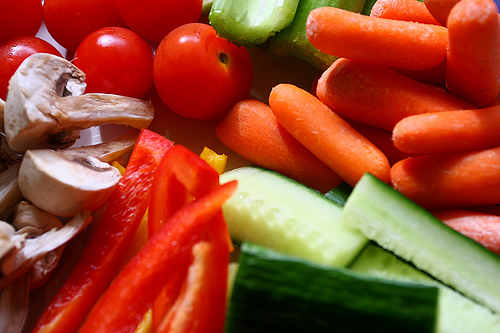Maintaining your garden in the high heat of these summer months can be a challenge, but hang in there – we have got some tips to help you continue enjoying the fruits of your hard work!
The Watering Myth
We have all been told that watering in the heat of the day is a bad idea because overhead watering has led people to believe that they will burn the leaves on their plants. It turns out that this common practice is only half true – if the leaves are smooth, they will not burn. If the leaves are hairy (like with ferns and tomato plants), the leaves can burn because the water droplets are held atop the little hairs when they get wet, and when sunlight passes through, it beams directly onto the leaf, much like a magnifying glass.
It is also important to keep in mind that watering after dark is an absolute no-no – especially in humid climates. You want dry plants by nightfall so that they can sleep dry to cut down on fungus. Fungi that are susceptible to overhead watering, primarily at night, are known as leaf spots, which are very popular with hydrangeas and cherry laurels. Watering at night a bad idea. You do not want your plants to suffer from root rot because you tucked them into bed all wet. Overall, when it comes to watering, the best time of day to water is early morning so that the soil can dry throughout the day.
Weeding
Weeding is everyone’s least favorite gardening chore. But the truth is, for a healthy garden, weeding needs to be kept up with weekly to make sure that the weeds are not pulling nutrients from your plants. Designate a podcast or a new musical artist you are currently exploring for your weekly weeding responsibility to encourage you to block out that time. Pop in those headphones and zone out while you work hard to get the most out of your garden.
Fun fact: Growing buckwheat around garden plants is a natural way to keep weeds out of your garden. And did you know that buckwheat is also a great pollinator for bees? Now that is a doubly-effective grain!
Diatomaceous Earth: An Incredibly Powerful and Completely Organic Pesticide
If you are dealing with an overwhelming number of insects infesting your garden, try using diatomaceous earth (DE). It is a composite of fossilized remains of plankton and single-celled algae called diatoms. The cell walls of diatoms contain silica, which has accumulated into sediment of earth’s streams, lakes, rivers and oceans and is completely safe for mammals to consume. However, when diatomaceous earth enters the bodies of insects, it gets under their exoskeletons and cuts them, in addition to causing dehydration. While diatomaceous earth is a seemingly harsh way to say goodbye to garden bugs eating holes in your hard work, it is a completely natural powder, and it is safe for consumption, unlike harmful insecticides. In fact, it is often found in grain-based products we eat everyday, such as cereal!
Trimming and Pruning
Keeping your plants trimmed and pruned is of equal importance when caring for your planted ones. In the same way that haircuts help maintain healthy hair growth, plants, like trees and shrubs, need to be trimmed and pruned to grow healthy and strong. The earlier you start with your plants, the less you will have to keep up with as they grow throughout the years. But remember – there is a difference between trimming and pruning! Trimming is simply cutting back what has overgrown, whereas pruning is when you are completely removing dead/loose parts of the plant, including infected areas.
Trimming and pruning are also natural methods for repelling insects that enjoy munching out on your plants, which is important because insects can spread diseases throughout the rest of an infected plant. As a result, branches can become weak if they become too infected and die, which can pose a safety hazard on your property.
Trimming and pruning your plants help rejuvenate them and keep those in and around your home safe for all seasons!
And Something Pretty: Roses in the Summer
Though it may seem counter-intuitive, do not over-water your roses in the high-heat of the summer. When it gets “too hot” for roses, as a natural self-defense mechanism, they shut down. This means they do not need nearly as much water for survival, but gardening experts advise a mild watering from time to time to help their leaves cool down.
Photo: Martin Cathrae

